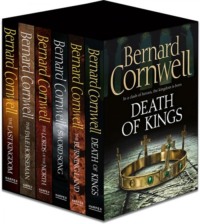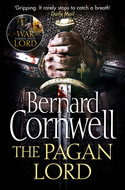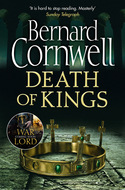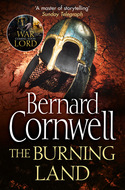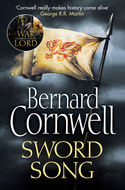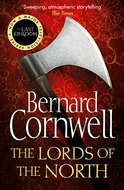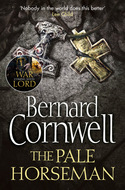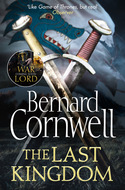Kitap dosya olarak indirilemez ancak uygulamamız üzerinden veya online olarak web sitemizden okunabilir.
Kitabı oku: «The Last Kingdom Series Books 1-6», sayfa 8
We came to a village, I never did learn its name, and we burned it to the ground. There was no one there. We burned farmsteads, a church, and marched on, following a road that angled away from the shore, and at dusk we saw a larger village and we hid in a wood, lit no fires, and attacked at dawn.
We came shrieking from the half-light. We were a nightmare in the dawn; men in leather with iron helmets, men with round painted shields, men with axes, swords and spears. The folk in that place had no weapons and no armour, and perhaps they had not even known there were Danes in their countryside for they were not ready for us. They died. A few brave men tried to make a stand by their church, but Ragnar led a charge against them and they were slaughtered where they stood, and Ragnar pushed open the church door to find the small building filled with women and children. The priest was in front of the altar and he cursed Ragnar in Latin as the Dane stalked up the small nave, and the priest was still cursing when Ragnar disembowelled him.
We took a bronze crucifix, a dented silver plate and some coins from the church. We found a dozen good cooking pots in the houses and some shears, sickles and iron spits. We captured cattle, goats, sheep, oxen, eight horses, and sixteen young women. One woman screamed that she could not leave her child and I watched Weland spit the small boy on a spear, then thrust the bloodied corpse into the woman’s arms. Ragnar sent her away, not because he pitied her, but because one person was always spared to carry news of the horror to other places. Folk must fear the Danes, Ragnar said, and then they would be ready to surrender. He gave me a piece of burning wood he had taken from a fire. ‘Burn the thatch, Uhtred,’ he ordered, so I went from house to house, putting fire to the reed thatch. I burned the church and then, just as I approached the last house, a man burst from the door with a three-pronged eel spear that he lunged at me. I twisted aside, avoiding his thrust by luck rather than judgement, and I hurled the burning wood at the man’s face and the flames made him duck as I backed away, and Ragnar threw me a spear, a heavy war spear made for thrusting rather than throwing, and it skidded in the dust in front of me and I understood he was letting me fight as I plucked it up. He would not have let me die, for he had two of his bowmen standing ready with arrows on their strings, but he did not interfere as the man ran at me and lunged again.
I parried, knocking the rusted eel spear aside and stepping back again to give myself room. The man was twice my size and more than twice my weight. He was cursing me, calling me a devil’s bastard, a worm of hell, and he rushed me again and I did what I had learned hunting the boar. I stepped to my left, waited till he levelled the spear, stepped back to the right and thrust.
It was not a clean thrust, nor did I have the weight to hurl him back, but the spear point punctured his belly and then his weight pushed me back as he half snarled and half gasped, and I fell, and he fell on top of me, forced sideways because the spear was in his guts, and he tried to take a grip of my throat, but I wriggled out from beneath him, picked up his own eel spear and rammed it at his throat. There were rivulets of blood on the earth, droplets spraying in the air, and he was jerking and choking, blood bubbling at his ripped throat, and I tried to pull the eel spear back, but the barbs on the points were caught in his gullet, so I ripped the war spear from his belly and tried to stop him jerking by thrusting it down hard into his chest, but it only glanced off his ribs. He was making a terrible noise, and I suppose I was in a panic, and I was unaware that Ragnar and his men were almost helpless with laughter as they watched me try to kill the East Anglian. I did, in the end, or else he just bled to death, but by then I had poked and stabbed and torn him until he looked as though a pack of wolves had set on him.
But I got a third arm ring, and there were grown warriors in Ragnar’s band who only wore three. Rorik was jealous, but he was younger and his father consoled him that his time would come. ‘How does it feel?’ Ragnar asked me.
‘Good,’ I said, and God help me, it did.
It was then that I first saw Brida. She was my age, black-haired, thin as a twig, with big dark eyes and a spirit as wild as a hawk in spring, and she was among the captured women and, as the Danes began dividing those captives amongst themselves, an older woman pushed the child forward as if giving her to the Vikings. Brida snatched up a piece of wood and turned on the woman and beat at her, driving her back, screaming that she was a sour-faced bitch, a dried-up hank of gristle, and the older woman tripped and fell into a patch of nettles where Brida went on thrashing her. Ragnar was laughing, but eventually pulled the child away and, because he loved anyone with spirit, gave her to me. ‘Keep her safe,’ he said, ‘and burn that last house.’
So I did.
And I learned another thing.
Start your killers young, before their consciences are grown. Start them young and they will be lethal.
We took our plunder back to the ships and that night, as I drank my ale, I thought of myself as a Dane. Not English, not any more. I was a Dane and I had been given a perfect childhood, perfect, at least, to the ideas of a boy. I was raised among men, I was free, I ran wild, I was encumbered by no laws, was troubled by no priests, was encouraged to violence, and I was rarely alone.
And it was that, that I was rarely alone, which kept me alive.
Every raid brought more horses, and more horses meant more men could go farther afield and waste more places, steal more silver and take more captives. We had scouts out now, watching for the approach of King Edmund’s army. Edmund ruled East Anglia and, unless he wished to collapse as feebly as Burghred of Mercia, he had to send men against us to preserve his kingdom, and so we watched the roads and waited.
Brida stayed close to me. Ragnar had taken a strong liking to her, probably because she treated him defiantly and because she alone did not weep when she was captured. She was an orphan and had been living in the house of her aunt, the woman whom she had beaten and whom she hated, and within days Brida was happier among the Danes than she had ever been among her own people. She was a slave now, a slave who was supposed to stay in the camp and cook, but one dawn as we went raiding she ran after us and hauled herself up behind my saddle and Ragnar was amused by that and let her come along.
We went far south that day, out of the flat lands where the marshes stretched, and into low wooded hills amongst which were fat farms and a fatter monastery. Brida laughed when Ragnar killed the abbot, and afterwards, as the Danes collected their plunder, she took my hand and led me over a low rise to a farm which had already been plundered by Ragnar’s men. The farm belonged to the monastery and Brida knew the place because her aunt had frequently gone to the monastery to pray. ‘She wanted children,’ Brida said, ‘and only had me.’ Then she pointed at the farm and watched for my reaction.
It was a Roman farm, she told me, though like me she had little idea who the Romans really were, only that they had once lived in England and then had gone. I had seen plenty of their buildings before, there were some in Eoferwic, but those other buildings had crumbled, then been patched with mud and reroofed with thatch, while this farm looked as though the Romans had only just left.
It was astonishing. The walls were of stone, perfectly cut, square and close-mortared, and the roof was of tile, patterned and tight-fitting, and inside the gate was a courtyard surrounded with a pillared walkway and in the largest room was an amazing picture on the floor, made up of thousands of small coloured stones, and I gaped at the leaping fish that were pulling a chariot in which a bearded man stood holding an eel spear like the one I had faced in Brida’s village. Hares surrounded the picture, chasing each other through looping strands of leaves. There had been other pictures painted on the walls, but they had faded or else been discoloured by water that had leaked through the old roof. ‘It was the abbot’s house,’ Brida told me, and she took me into a small room where there was a cot beside which one of the abbot’s servants lay dead in his own blood. ‘He brought me in here,’ she said.
‘The abbot did?’
‘And told me to take my clothes off.’
‘The abbot did?’ I asked again.
‘I ran away,’ she said in a very matter-of-fact tone, ‘and my aunt beat me. She said I should have pleased him and he’d have rewarded us.’
We wandered through the house and I felt a wonder that we could no longer build like this. We knew how to sink posts in the ground and make beams and rafters and roof them with thatch from rye or reed, but the posts rotted, the thatch mouldered, and the houses sagged. In summer our houses were winter dark, and all year they were choked with smoke, and in winter they stank of cattle, yet this house was light and clean and I doubted any cow had ever dunged on the man in his fish-drawn chariot. It was an unsettling thought, that somehow we were sliding back into the smoky dark and that never again would man make something so perfect as this small building. ‘Were the Romans Christians?’ I asked Brida.
‘Don’t know,’ she said. ‘Why?’
‘Nothing,’ I said, but I had been thinking that the gods reward those they love and it would have been nice to know which gods had looked after the Romans. I hoped they had worshipped Odin, though these days, I knew, they were Christians because the Pope lived in Rome and Beocca had taught me that the Pope was the chief of all the Christians, and was a very holy man. His name, I remembered, was Nicholas. Brida could not have cared less about the gods of the Romans, instead she knelt to explore a hole in the floor that seemed to lead only to a cellar so shallow that no person could ever get inside. ‘Maybe elves lived there?’ I suggested.
‘Elves live in the woods,’ she insisted. She decided the abbot might have hidden treasures in the space and borrowed my sword so she could widen the hole. It was not a real sword, merely a sax, a very long knife, but Ragnar had given it to me and I wore it proudly.
‘Don’t break the blade,’ I told her, and she stuck her tongue out at me, then began prising the mortar at the hole’s edge while I went back to the courtyard to look at the raised pond that was green and scummy now, but somehow I knew it had once been filled with clear water. A frog crawled onto the small stone island in the centre and I again remembered my father’s verdict on the East Anglians; mere frogs.
Weland came through the gate. He stopped just inside and licked his lips, tongue flickering, then half smiled. ‘Lost your sax, Uhtred?’
‘No,’ I said.
‘Ragnar sent me,’ he said, ‘we’re leaving.’
I nodded, said nothing, but knew that Ragnar would have sounded a horn if we were truly ready to leave.
‘So come on, boy,’ he said.
I nodded again, still said nothing.
His dark eyes glanced at the building’s empty windows, then at the pool. ‘Is that a frog,’ he asked, ‘or a toad?’
‘A frog.’
‘In Frankia,’ he said, ‘men say you can eat frogs.’ He walked towards the pool and I moved to stay on the far side from him, keeping the raised stone structure between us. ‘Have you eaten a frog, Uhtred?’
‘No.’
‘Would you like to?’
‘No.’
He put a hand into a leather bag which hung from his sword belt that was strapped over a torn mail coat. He had money now, two arm rings, proper boots, an iron helmet, a long sword and the mail coat which needed mending, but was far better protection than the rags he had worn when he first came to Ragnar’s house. ‘This coin if you catch a frog,’ he said, spinning a silver penny in the air.
‘I don’t want to catch a frog,’ I said sullenly.
‘I do,’ he said, grinning, and he drew the sword, its blade hissing on the scabbard’s wooden throat, and he stepped into the pool, the water not reaching the tops of his boots, and the frog leaped away, plopping into the green scum, and Weland was not looking at the frog, but at me, and I knew he was going to kill me, but for some reason I could not move. I was astonished, and yet I was not astonished. I had never liked him, never trusted him, and I understood that he had been sent to kill me and had only failed because I had always been in company until this moment when I had let Brida lead me away from Ragnar’s band. So Weland had his chance now. He smiled at me, reached the centre of the pool, came closer, raised the sword and I found my feet at last and raced back into the pillared walkway. I did not want to go into the house, for Brida was there, and I knew he would kill her if he found her. He jumped out of the pond and chased me, and I raced down the walkway, around the corner, and he cut me off, and I dodged back, wanting to reach the gateway, but he knew that was what I wanted and he took care to keep between me and my escape. His boots left wet footprints on the Roman flagstones.
‘What’s the matter, Uhtred?’ he asked, ‘frightened of frogs?’
‘What do you want?’ I asked.
‘Not so cocky now, eh? Ealdorman?’ He stalked towards me, sword flashing from side to side. ‘Your uncle sends his regards and trusts you will burn in hell while he lives in Bebbanburg.’
‘You come from …’ I began, but it was obvious Weland was serving Ælfric so I did not bother to finish the question, but instead edged backwards.
‘The reward for your death will be the weight of his newborn child in silver,’ Weland said, ‘and the child should be born by now. And he’s impatient for your death, your uncle is. I almost managed to track you down that night outside Snotengaham, and almost hit you with an arrow last winter, but you ducked. Not this time, but it will be quick, boy. Your uncle said to make it quick, so kneel down, boy, just kneel.’ He swept the blade left and right, his wrist whippy so the sword hissed. ‘I haven’t given her a name yet,’ he said. ‘Perhaps after this she’ll be known as Orphan-Killer.’
I feinted right, went left, but he was quick as a stoat and he blocked me, and I knew I was cornered, and he knew it too and smiled. ‘I’ll make it quick,’ he said, ‘I promise.’
Then the first roof tile hit his helmet. It could not have hurt much, but the unexpected blow jarred him backwards and confused him, and the second tile hit his waist and the third smacked him on the shoulder, and Brida shouted from the roof. ‘Back through the house!’ I ran, the lunging sword missing me by inches, and I twisted through the door, ran over the fish-drawn chariot, through a second door, another door, saw an open window and dove through, and Brida jumped down from the roof and together we ran for the nearby woods.
Weland followed me, but he abandoned the pursuit when we vanished in the trees. Instead he went south, on his own, fleeing what he knew Ragnar would do to him, and for some reason I was in tears by the time I found Ragnar again. Why did I cry? I do not know, unless it was the confirmation that Bebbanburg was gone, that my beloved refuge was occupied by an enemy, and an enemy who, by now, might have a son.
Brida received an arm ring, and Ragnar let it be known that if any man touched her he, Ragnar, would personally geld that man with a mallet and a plank-splitter. She rode home on Weland’s horse.
And next day the enemy came.
Ravn had sailed with us, blind though he was, and I was required to be his eyes so I described how the East Anglian army was forming on a low ridge of dry land to the south of our camp. ‘How many banners?’ he asked me.
‘Twenty-three,’ I said, after a pause to count them.
‘Showing?’
‘Mostly crosses,’ I said, ‘and some saints.’
‘He’s a very pious man, King Edmund,’ Ravn said, ‘he even tried to persuade me to become a Christian.’ He chuckled at the memory. We were sitting on the prow of one of the beached ships, Ravn in a chair, Brida and I at his feet, and the Mercian twins, Ceolnoth and Ceolberht on his far side. They were the sons of Bishop Æthelbrid of Snotengaham and they were hostages even though their father had welcomed the Danish army, but, as Ravn said, taking the bishop’s sons hostage would keep the man honest. There were dozens of other such hostages from Mercia and Northumbria, all sons of prominent men, and all under sentence of death if their fathers caused trouble. There were other Englishmen in the army, serving as soldiers and, if it were not for the language they spoke, they would have been indistinguishable from the Danes. Most of them were either outlaws or masterless men, but all were savage fighters, exactly the kind of men the English needed to face their enemy, but now those men were fighting for the Danes against King Edmund. ‘And he’s a fool,’ Ravn said scornfully.
‘A fool?’ I asked.
‘He gave us shelter during the winter before we attacked Eoferwic,’ Ravn explained, ‘and we had to promise not to kill any of his churchmen.’ He laughed softly. ‘What a very silly condition. If their god was any use then we couldn’t have killed them anyway.’
‘Why did he give you shelter?’
‘Because it was easier than fighting us,’ Ravn said. He was using English because the other three children did not understand Danish, though Brida was learning quickly. She had a mind like a fox, quick and sly. Ravn smiled. ‘The silly King Edmund believed we would go away in the springtime and not come back, yet here we are.’
‘He shouldn’t have done it,’ one of the twins put in. I could not tell them apart, but was annoyed by them for they were fierce Mercian patriots, despite their father’s change of allegiance. They were ten years old and forever upbraiding me for loving the Danes.
‘Of course he shouldn’t have done it,’ Ravn agreed mildly.
‘He should have attacked you!’ Ceolnoth or Ceolberht said.
‘He would have lost if he had,’ Ravn said, ‘we made a camp, protected it with walls, and stayed there. And he paid us money to make no trouble.’
‘I saw King Edmund once,’ Brida put in.
‘Where was that, child?’ Ravn asked.
‘He came to the monastery to pray,’ she said, ‘and he farted when he knelt down.’
‘No doubt their god appreciated the tribute,’ Ravn said loftily, frowning because the twins were now making farting noises.
‘Were the Romans Christians?’ I asked him, remembering my curiosity at the Roman farm.
‘Not always,’ Ravn said. ‘They had their own gods once, but they gave them up to become Christians and after that they knew nothing but defeat. Where are our men?’
‘Still in the marsh,’ I said.
Ubba had hoped to stay in the camp and so force Edmund’s army to attack along the narrow neck of land and die on our short earthen wall, but instead the English had remained south of the treacherous lowland and were inviting us to attack them. Ubba was tempted. He had made Storri cast the runesticks and rumour said that the result was uncertain, and that fed Ubba’s caution. He was a fearsome fighter, but always wary when it came to picking a fight, but the runesticks had not predicted disaster and so he had taken the army out into the marsh where it now stood on whatever patches of drier land it could find, and from where two tracks led up to the low ridge. Ubba’s banner, the famous raven on its three-sided cloth, was midway between the two paths, both of which were strongly guarded by East Anglian shield walls, and any attack up either path would mean that a few of our men would have to attack a lot of theirs, and Ubba must have been having second thoughts for he was hesitating. I described all that to Ravn.
‘It doesn’t do,’ he told me, ‘to lose men, even if we win.’
‘But if we kill lots of theirs?’ I asked.
‘They have more men, we have few. If we kill a thousand of theirs then they will have another thousand tomorrow, but if we lose a hundred men then we must wait for more ships to replace them.’
‘More ships are coming,’ Brida said.
‘I doubt there will be any more this year,’ Ravn said.
‘No,’ she insisted, ‘now,’ and she pointed and I saw four ships nosing their way through the tangle of low islands and shallow creeks.
‘Tell me,’ Ravn said urgently.
‘Four ships,’ I said, ‘coming from the west.’
‘From the west? Not the east?’
‘From the west,’ I insisted, which meant they were not coming from the sea, but from one of the four rivers which flowed into the Gewæsc.
‘Prows?’ Ravn demanded.
‘No beasts on the prows,’ I said, ‘just plain wooden posts.’
‘Oars?’
‘Ten a side, I think, maybe eleven. But there are far more men than rowers.’
‘English ships!’ Ravn sounded amazed, for other than small fishing craft and some tubby cargo vessels the English had few ships, yet these four were warships, built long and sleek like the Danish ships, and they were creeping through the mazy waterways to attack Ubba’s beached fleet. I could see smoke trickling from the foremost ship and knew they must have a brazier on board and so were planning to burn the Danish boats and thus trap Ubba.
But Ubba had also seen them, and already the Danish army was streaming back towards the camp. The leading English ship began to shoot fire-arrows at the closest Danish boat and, though there was a guard on the boats, that guard was composed of the sick and the lame, and they were not strong enough to defend the ships against a seaborne attack. ‘Boys!’ one of the guards bellowed.
‘Go,’ Ravn told us, ‘go,’ and Brida, who considered herself as good as any boy, came with the twins and me. We jumped down to the beach and ran along the water’s edge to where smoke was thickening above the beached Danish boat. Two English ships were shooting fire-arrows now, while the last two attackers were trying to edge past their companions to reach more of our craft.
Our job was to extinguish the fire while the guards hurled spears at the English crews. I used a shield to scoop up sand that I dumped onto the fire. The English ships were close and I could see they were made of new raw wood. A spear thumped close to me and I picked it up and threw it back, though feebly because it clattered against an oar and fell into the sea. The twins were not trying to put out the fire and I hit one of them and threatened to hit him harder if they did not make an effort, but we were too late to save the first Danish ship which was well ablaze, so we abandoned it and tried to rescue the next one, but a score of fire-arrows slammed into the rowers’ benches, another landed on the furled sail, and two of the boys were dead at the water’s edge. The leading English ship turned to the beach then, its prow thick with men bristling with spears, axes and swords. ‘Edmund!’ they shouted, ‘Edmund!’ The bow grated on the beach and the warriors jumped off to begin slaughtering the Danish ships’ guard. The big axes slammed down and blood spattered up the beach or was sluiced away by the tiny waves which washed the sand. I grabbed Brida’s hand and pulled her away, splashing through a shallow creek where tiny silver fish scattered in alarm. ‘We have to save Ravn!’ I told her.
She was laughing. Brida always enjoyed chaos.
Three of the English ships had beached themselves and their crews were ashore, finishing off the Danish guards. The last ship glided on the falling tide, shooting fire-arrows, but then Ubba’s men were back in the camp and they advanced on the English with a roar. Some men had stayed with the raven banner at the earthen wall to make sure King Edmund’s forces could not swarm over the neck of land to take the camp, but the rest came screaming and vengeful. The Danes love their ships. A ship, they say, is like a woman or a sword, sharp and beautiful, worth dying for, and certainly worth fighting for, and the East Anglians, who had done so well, had now made a mistake for the tide was ebbing and they could not shove their boats off into the small waves. Some of the Danes protected their own unharmed boats by raining throwing axes, spears and arrows at the crew of the single enemy boat afloat, while the rest attacked the Englishmen ashore.
That was a slaughter. That was Danish work. That was a fit fight for the skalds to celebrate. Blood was thick on the tideline, blood slurping with the rise and fall of the small waves, men screaming and falling, and all about them the smoke of the burning boats was whirling so that the hazed sun was red above a sand turned red, and in that smoke the rage of the Danes was terrible. It was then I first saw Ubba fight and marvelled at him, for he was a bringer of death, a grim warrior, a sword-lover. He did not fight in a shield wall, but ran into his enemies, shield slamming one way as his war axe gave death in the other, and it seemed he was indestructible for, at one moment, he was surrounded by East Anglian fighters, but there was a scream of hate, a clash of blade on blade, and Ubba came out of the tangle of men, his blade red, blood in his beard, trampling his enemies into the blood-rich tide, and looking for more men to kill. Ragnar joined him, and Ragnar’s men followed, harvesting an enemy beside the sea, screaming hate at men who had burned their ships, and when the screaming and killing were done we counted sixty-eight English bodies, and some we could not count for they had run into the sea and drowned there, dragged down by the weight of weapons and armour. The sole East Anglian ship to escape was a ship of the dying, its new wooden flanks running with blood. The victorious Danes danced over the corpses they had made, then made a heap of captured weapons. There were thirty Danish dead, and those men were burned on a half-burned ship, another six Danish craft had been destroyed, but Ubba captured the three beached English boats which Ragnar declared to be pieces of shit. ‘It’s astonishing they even floated,’ he said, kicking at a badly caulked strake.
Yet the East Anglians had done well, I thought. They had made mistakes, but they had hurt Danish pride by burning dragon ships, and if King Edmund had attacked the wall protecting the camp he might have turned the slaughter into a massacre of Danes, but King Edmund had not attacked. Instead, as his shipmen died beneath the smoke, he had marched away.
He thought he was facing the Danish army by the sea, only to find that the real attack had come by land. He had just learned that Ivar the Boneless was invading his land.
And Ubba was enraged. The few English prisoners were sacrificed to Odin, their screams a call to the god that we needed his help. And next morning, leaving the burned boats like smoking black skeletons on the beach, we rowed the dragon fleet west.
